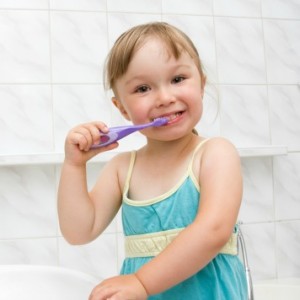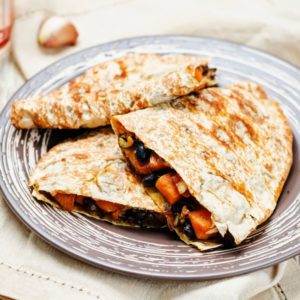
Read these quick tips to help your children have strong teeth for a lifetime!
It may be surprising to learn that dental problems in primary (baby) teeth can affect the growth of permanent (adult) teeth. Aside from being painful, tooth abscesses in young children can cause infections throughout the body, and often require general anesthesia to treat.
Fluoride
Fluoride is an important mineral that should be given to all children starting at 6 months of age. If fluoride is not in the water supply (or if the infant is breastfeeding), then a fluoride supplement may be needed and can be obtained from your dentist or pediatrician. Most bottled spring water found in stores is not fluoridated unless stated on the label. Speak with your dentist or doctor about the right amount of fluoride to include in the diet. It’s important not to get too much or too little.
Sugar
When oral bacteria feed on sugar, they produce acids which can cause cavities. How often sugar is eaten and how long it remains on the teeth is more important than how much. Any carbohydrate can lead to cavities because it provides a food source for the bacteria that cause them. Carbohydrates that are “sticky” (such as raisins, granola bars, candy, cookies, potato chips) stay on the teeth longer and allow the bacteria more time to grow. Additionally, sugared beverages and the juices from whole fruit can seep between teeth. Common snack foods such as pretzels or crackers can be eaten with protein/dairy foods (peanut butter, cheese, eggs, etc.) to lower the cavity-causing effect. In addition, whole grains are better than refined carbohydrates in terms of sticking to the teeth.
Constantly eating or drinking puts teeth in contact with sugars more often. Although most children need snacks to get enough calories to grow, three meals and two or three snacks daily are generally enough.
Sugar content in many drinks (even juice and milk) is high, and should not be given just before sleeping. It is best to have milk or juice with meals, and water in between. Most children do not need more than 4-6 ounces of juice per day. Soda is generally not recommended, as it is high in sugar (an 8 ounce can of soda has 10 teaspoons of sugar!) and the acidity can break down tooth enamel. Also, it can fill up the child so that he/she is too full for meals. Frequent brushing after food consumption can lessen the opportunity for the oral bacteria to thrive.
Healthy Snack Ideas
- Apple slices with peanut butter
- Multigrain pretzel rods with hummus
- Egg/tuna salad in whole wheat pita bread
- Vegetable sticks with dip
- Fruit salad or apple slices with cinnamon
- Yogurt mixed with fruit
- Cheese slices with whole grain crackers (i.e., Triscuits)
- Cheese quesadilla with salsa
- Bean burrito
- Cottage cheese with fruit
- Soup- Try Pumpkin Apple Soup or Yummy Lentil Soup
- Nuts, sunflower seeds, pumpkin seeds (be cautious as they can be a choking hazzard)
- Popcorn (over the age of 3)
Suggested eating habits to maintain good dental health
- If using chewable vitamins, give with meals (not after)
- Wait 2 hours between meals and snacks
- Brush teeth after eating “sticky” foods and before going to bed
- Only allow juice with meals or snacks
- Limit high sugar foods to 3 times a day or less, preferably with meals/snacks
- Limit soda and other high sugar beverages (such as fruit “drinks”)
- Consider chewing sugar-free gum containing xylitol after eating if you have a health history of cavities
- Have specific meal and snack times (avoid grazing)
- Include protein or dairy products with meals and snacks
- Don’t allow infants to sleep with a bottle
- Transition infants from a bottle to a sippy cup by about 12 months old. Teach small children to enjoy water. If using juice, make sure that it is 100% juice and not a sugared flavored beverage juice drink. Dilute when possible.
Learn more ways to protect your child’s health with Super Foods.












